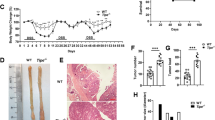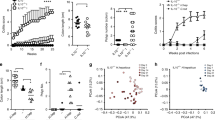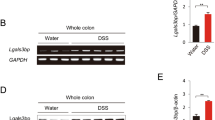Abstract
Inflammatory bowel disease (IBD) is an important etiologic factor in the development of colorectal cancer. However, the mechanism underlying carcinogenesis through chronic inflammation is still unknown. Activation-induced cytidine deaminase (AID) is induced by the inflammation and involved in various human carcinogenesis via its mutagenic activity. In the current study, we investigated whether the inflammation/AID axis plays an integral role in the development of colitis-associated cancers. Inflammation in the cecum was more severe than that in other colonic regions, and endogenous AID expression was enhanced most prominently in the inflamed cecal mucosa of interleukin (IL)-10−/− mice. Blockade of tumor necrosis factor (TNF)-α and IL-12 significantly suppressed AID expression. Although proinflammatory cytokine expression was comparable between IL-10−/−AID+/+ and IL-10−/−AID−/− mice, sequencing analyses revealed a significantly lower incidence of somatic mutations in Trp53 gene in the colonic mucosa of IL-10−/−AID−/− than IL-10−/−AID+/+ mice. Colon cancers spontaneously developed in the cecum in 6 of 22 (27.2%) IL-10−/−AID+/+ mice. In contrast, none of the IL-10−/−AID−/− mice developed cancers except only one case of neoplasia in the distal colon. These findings suggest that the proinflammatory cytokine-induced aberrant production of AID links colonic inflammation to an enhanced genetic susceptibility to oncogenic mutagenesis. Targeting AID could be a novel strategy to prevent colitis-associated colon carcinogenesis irrespective of ongoing colonic inflammation.
This is a preview of subscription content, access via your institution
Access options
Subscribe to this journal
Receive 50 print issues and online access
$259.00 per year
only $5.18 per issue
Buy this article
- Purchase on Springer Link
- Instant access to full article PDF
Prices may be subject to local taxes which are calculated during checkout





Similar content being viewed by others
Abbreviations
- AID:
-
activation-induced cytidine deaminase
- cDNA:
-
complementary DNA
- IBD:
-
inflammatory bowel disease
- IFN:
-
interferon
- IL:
-
interleukin
- mAb:
-
monoclonal antibody
- NF:
-
nuclear factor
- RT–PCR:
-
reverse transcription–PCR
- TNF:
-
tumor necrosis factor
- TP53 :
-
tumor protein p53
- WT:
-
wild type
References
Ammirante M, Luo JL, Grivennikov S, Nedospasov S, Karin M . (2010). B-cell-derived lymphotoxin promotes castration-resistant prostate cancer. Nature 464: 302–305.
Berg DJ, Davidson N, Kuhn R, Muller W, Menon S, Holland G et al. (1996). Enterocolitis and colon cancer in interleukin-10-deficient mice are associated with aberrant cytokine production and CD4(+) TH1-like responses. J Clin Invest 98: 1010–1020.
Bhutani N, Brady JJ, Damian M, Sacco A, Corbel SY, Blau HM . (2010). Reprogramming towards pluripotency requires AID-dependent DNA demethylation. Nature 463: 1042–1047.
Chiba T, Marusawa H . (2009). A novel mechanism for inflammation-associated carcinogenesis; an important role of activation-induced cytidine deaminase (AID) in mutation induction. J Mol Med 87: 1023–1027.
Chiba T, Seno H, Marusawa H, Wakatsuki Y, Okazaki K . (2006). Host factors are important in determining clinical outcomes of Helicobacter pylori infection. J Gastroenterol 41: 1–9.
Davidson NJ, Leach MW, Fort MM, Thompson-Snipes L, Kuhn R, Muller W et al. (1996). T helper cell 1-type CD4+ T cells, but not B cells, mediate colitis in interleukin 10-deficient mice. J Exp Med 184: 241–251.
Eaden JA, Abrams KR, Mayberry JF . (2001). The risk of colorectal cancer in ulcerative colitis: a meta-analysis. Gut 48: 526–535.
Endo Y, Marusawa H, Kinoshita K, Morisawa T, Sakurai T, Okazaki IM et al. (2007). Expression of activation-induced cytidine deaminase in human hepatocytes via NF-kappaB signaling. Oncogene 26: 5587–5595.
Endo Y, Marusawa H, Kou T, Nakase H, Fujii S, Fujimori T et al. (2008). Activation-induced cytidine deaminase links between inflammation and the development of colitis-associated colorectal cancers. Gastroenterology 135: 889–898, 898 e1–3.
Fagarasan S, Kinoshita K, Muramatsu M, Ikuta K, Honjo T . (2001). In situ class switching and differentiation to IgA-producing cells in the gut lamina propria. Nature 413: 639–643.
Fagarasan S, Muramatsu M, Suzuki K, Nagaoka H, Hiai H, Honjo T . (2002). Critical roles of activation-induced cytidine deaminase in the homeostasis of gut flora. Science 298: 1424–1427.
Fearon ER, Vogelstein B . (1990). A genetic model for colorectal tumorigenesis. Cell 61: 759–767.
Fuss IJ, Neurath M, Boirivant M, Klein JS, de la Motte C, Strong SA et al. (1996). Disparate CD4+ lamina propria (LP) lymphokine secretion profiles in inflammatory bowel disease. Crohn's disease LP cells manifest increased secretion of IFN-gamma, whereas ulcerative colitis LP cells manifest increased secretion of IL-5. J Immunol 157: 1261–1270.
Glocker EO, Kotlarz D, Boztug K, Gertz EM, Schaffer AA, Noyan F et al. (2009). Inflammatory bowel disease and mutations affecting the interleukin-10 receptor. N Engl J Med 361: 2033–2045.
Guo JU, Su Y, Zhong C, Ming GL, Song H . (2011). Hydroxylation of 5-methylcytosine by TET1 promotes active DNA demethylation in the adult brain. Cell 145: 423–434.
Holzmann K, Klump B, Borchard F, Hsieh CJ, Kuhn A, Gaco V et al. (1998). Comparative analysis of histology, DNA content, p53 and Ki-ras mutations in colectomy specimens with long-standing ulcerative colitis. Int J Cancer 76: 1–6.
Hussain SP, Amstad P, Raja K, Ambs S, Nagashima M, Bennett WP et al. (2000). Increased p53 mutation load in noncancerous colon tissue from ulcerative colitis: a cancer-prone chronic inflammatory disease. Cancer Res 60: 3333–3337.
Ikeda K, Marusawa H, Osaki Y, Nakamura T, Kitajima N, Yamashita Y et al. (2007). Antibody to hepatitis B core antigen and risk for hepatitis C-related hepatocellular carcinoma: a prospective study. Ann Intern Med 146: 649–656.
Inoue S, Nakase H, Matsuura M, Mikami S, Ueno S, Uza N et al. (2009). The effect of proteasome inhibitor MG132 on experimental inflammatory bowel disease. Clin Exp Immunol 156: 172–182.
Kern SE, Redston M, Seymour AB, Caldas C, Powell SM, Kornacki S et al. (1994). Molecular genetic profiles of colitis-associated neoplasms. Gastroenterology 107: 420–428.
Komori J, Marusawa H, Machimoto T, Endo Y, Kinoshita K, Kou T et al. (2008). Activation-induced cytidine deaminase links bile duct inflammation to human cholangiocarcinoma. Hepatology 47: 888–896.
Kou T, Marusawa H, Kinoshita K, Endo Y, Okazaki IM, Ueda Y et al. (2007). Expression of activation-induced cytidine deaminase in human hepatocytes during hepatocarcinogenesis. Int J Cancer 120: 469–476.
Kuhn R, Lohler J, Rennick D, Rajewsky K, Muller W . (1993). Interleukin-10-deficient mice develop chronic enterocolitis. Cell 75: 263–274.
Lashner BA, Shapiro BD, Husain A, Goldblum JR . (1999). Evaluation of the usefulness of testing for p53 mutations in colorectal cancer surveillance for ulcerative colitis. Am J Gastroenterol 94: 456–462.
Leedham SJ, Graham TA, Oukrif D, McDonald SA, Rodriguez-Justo M, Harrison RF et al. (2009). Clonality, founder mutations, and field cancerization in human ulcerative colitis-associated neoplasia. Gastroenterology 136: 542–550 e6.
Lin WW, Karin M . (2007). A cytokine-mediated link between innate immunity, inflammation, and cancer. J Clin Invest 117: 1175–1183.
Liu R, Bal HS, Desta T, Behl Y, Graves DT . (2006). Tumor necrosis factor-alpha mediates diabetes-enhanced apoptosis of matrix-producing cells and impairs diabetic healing. Am J Pathol 168: 757–764.
Mantovani A, Allavena P, Sica A, Balkwill F . (2008). Cancer-related inflammation. Nature 454: 436–444.
Marra F, Valente AJ, Pinzani M, Abboud HE . (1993). Cultured human liver fat-storing cells produce monocyte chemotactic protein-1. Regulation by proinflammatory cytokines. J Clin Invest 92: 1674–1680.
Matsumoto Y, Marusawa H, Kinoshita K, Endo Y, Kou T, Morisawa T et al. (2007). Helicobacter pylori infection triggers aberrant expression of activation-induced cytidine deaminase in gastric epithelium. Nat Med 13: 470–476.
Morisawa T, Marusawa H, Ueda Y, Iwai A, Okazaki IM, Honjo T et al. (2008). Organ-specific profiles of genetic changes in cancers caused by activation-induced cytidine deaminase expression. Int J Cancer 123: 2735–2740.
Muramatsu M, Kinoshita K, Fagarasan S, Yamada S, Shinkai Y, Honjo T . (2000). Class switch recombination and hypermutation require activation-induced cytidine deaminase (AID), a potential RNA editing enzyme. Cell 102: 553–563.
Nakatani T, Mizuhara E, Minaki Y, Sakamoto Y, Ono Y . (2004). Helt, a novel basic-helix-loop-helix transcriptional repressor expressed in the developing central nervous system. J Biol Chem 279: 16356–16367.
Neurath MF, Pettersson S, Meyer zum Buschenfelde KH, Strober W . (1996). Local administration of antisense phosphorothioate oligonucleotides to the p65 subunit of NF-kappa B abrogates established experimental colitis in mice. Nat Med 2: 998–1004.
Podolsky DK . (2002). Inflammatory bowel disease. N Engl J Med 347: 417–429.
Popivanova BK, Kitamura K, Wu Y, Kondo T, Kagaya T, Kaneko S et al. (2008). Blocking TNF-alpha in mice reduces colorectal carcinogenesis associated with chronic colitis. J Clin Invest 118: 560–570.
Rai K, Huggins IJ, James SR, Karpf AR, Jones DA, Cairns BR . (2008). DNA demethylation in zebrafish involves the coupling of a deaminase, a glycosylase, and gadd45. Cell 135: 1201–1212.
Redston MS, Papadopoulos N, Caldas C, Kinzler KW, Kern SE . (1995). Common occurrence of APC and K-ras gene mutations in the spectrum of colitis-associated neoplasias. Gastroenterology 108: 383–392.
Sturlan S, Oberhuber G, Beinhauer BG, Tichy B, Kappel S, Wang J et al. (2001). Interleukin-10-deficient mice and inflammatory bowel disease associated cancer development. Carcinogenesis 22: 665–671.
Suzuki K, Meek B, Doi Y, Muramatsu M, Chiba T, Honjo T et al. (2004). Aberrant expansion of segmented filamentous bacteria in IgA-deficient gut. Proc Natl Acad Sci USA 101: 1981–1986.
Takai A, Toyoshima T, Uemura M, Kitawaki Y, Marusawa H, Hiai H et al. (2009). A novel mouse model of hepatocarcinogenesis triggered by AID causing deleterious p53 mutations. Oncogene 28: 469–478.
Toda Y, Kono K, Abiru H, Kokuryo K, Endo M, Yaegashi H et al. (1999). Application of tyramide signal amplification system to immunohistochemistry: a potent method to localize antigens that are not detectable by ordinary method. Pathol Int 49: 479–483.
Watanabe T, Kitani A, Murray PJ, Wakatsuki Y, Fuss IJ, Strober W . (2006). Nucleotide binding oligomerization domain 2 deficiency leads to dysregulated TLR2 signaling and induction of antigen-specific colitis. Immunity 25: 473–485.
Yin J, Harpaz N, Tong Y, Huang Y, Laurin J, Greenwald BD et al. (1993). p53 point mutations in dysplastic and cancerous ulcerative colitis lesions. Gastroenterology 104: 1633–1639.
Acknowledgements
We thank Dr Keiichiro Suzuki and Dr Tasuku Honjo for critical reading of this manuscript, and Dr Masamichi Muramatsu for providing information of siRNA for AID. This work was supported by grants-in-aid for Scientific Research from the Ministry of Education, Culture, Sports, Science; a grant-in-aid for Scientific Research from the Ministry of Health, Labor, and Welfare, Japan; and a research grant of the Princess Takamatsu Cancer Research Fund.
Author information
Authors and Affiliations
Corresponding author
Ethics declarations
Competing interests
The authors declare no conflict of interest.
Additional information
Supplementary Information accompanies the paper on the Oncogene website
Supplementary information
Rights and permissions
About this article
Cite this article
Takai, A., Marusawa, H., Minaki, Y. et al. Targeting activation-induced cytidine deaminase prevents colon cancer development despite persistent colonic inflammation. Oncogene 31, 1733–1742 (2012). https://doi.org/10.1038/onc.2011.352
Received:
Revised:
Accepted:
Published:
Issue Date:
DOI: https://doi.org/10.1038/onc.2011.352
Keywords
This article is cited by
-
From inflammatory bowel disease to colorectal cancer: what’s the role of miRNAs?
Cancer Cell International (2022)
-
HIV Nef enhances the expression of oncogenic c-MYC and activation-induced cytidine deaminase in Burkitt lymphoma cells, promoting genomic instability
Infectious Agents and Cancer (2020)
-
B cell-intrinsic epigenetic modulation of antibody responses by dietary fiber-derived short-chain fatty acids
Nature Communications (2020)
-
Up-regulation of activation-induced cytidine deaminase and its strong expression in extra-germinal centres in IgG4-related disease
Scientific Reports (2019)
-
Genetic basis of hepatitis virus-associated hepatocellular carcinoma: linkage between infection, inflammation, and tumorigenesis
Journal of Gastroenterology (2017)



